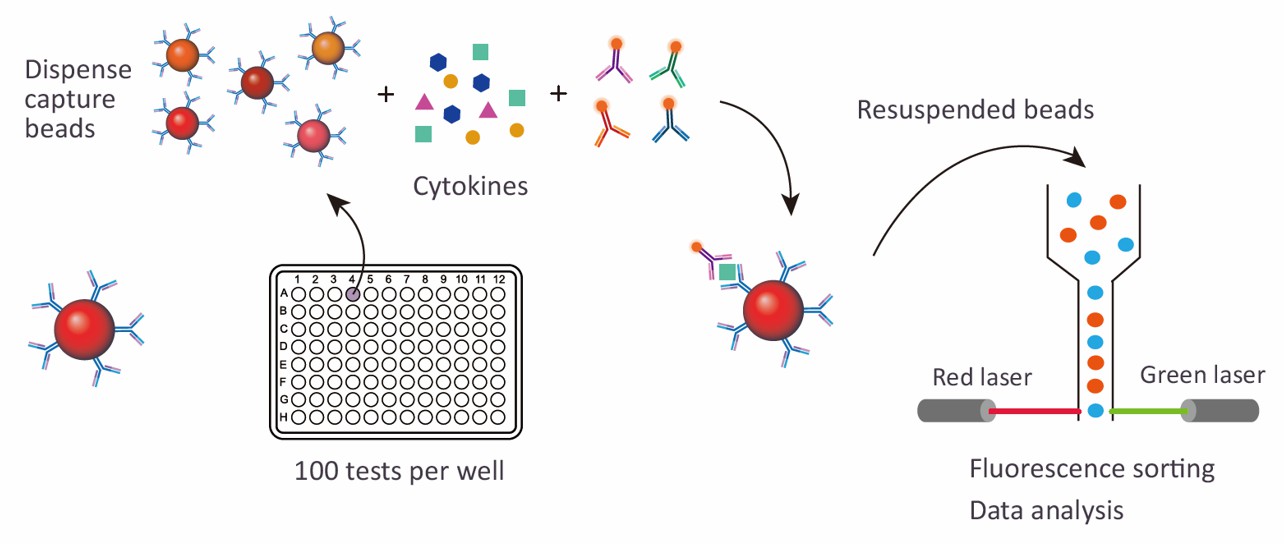- Services Overview
- FAQ
What is Human Adipokine?
Human adipokines, a diverse group of bioactive proteins secreted by adipose tissue, are central to the regulation of numerous physiological processes, including energy balance, glucose metabolism, and immune responses. These molecules, which include well-known adipokines such as adiponectin, leptin, and resistin, play critical roles in maintaining metabolic homeostasis and modulating inflammatory pathways. The dysregulation of adipokine secretion and signaling is strongly associated with the development of metabolic disorders, including obesity, insulin resistance, type 2 diabetes, and cardiovascular diseases.
The significance of analyzing human adipokines lies in their ability to provide a deeper understanding of the molecular mechanisms that drive these complex diseases. By quantifying adipokine levels and studying their interactions with other metabolic factors, we can uncover the underlying causes of metabolic dysfunctions. This analysis is particularly important in identifying the early biomarkers of disease, which can be used for diagnosis, risk assessment, and the monitoring of disease progression.
Furthermore, adipokines are not only markers of metabolic health but also potential therapeutic targets. Understanding their signaling pathways and interactions can lead to the development of new treatments aimed at modulating adipokine activity to restore metabolic balance. For example, targeting specific adipokines or their receptors could help improve insulin sensitivity, reduce chronic inflammation, and prevent the progression of metabolic diseases.
Human Adipokine Panel at Creative Proteomics
At Creative Proteomics, we offer adipokine analysis through our Human Adipokine 17 Plex/37 Plex Panel, powered by Luminex xMAP technology. This platform is designed to simultaneously detect and quantify multiple adipokines within a single sample, providing a comprehensive overview of their collective roles in metabolic and inflammatory pathways.
The Luminex xMAP technology leverages magnetic bead-based multiplex assays, allowing for the simultaneous analysis of up to 100 different analytes. This multiplexing capability significantly enhances efficiency and accuracy, making it ideal for high-throughput research. The technology is sensitive enough to detect adipokine concentrations as low as picograms per milliliter, ensuring reliable data even from limited or precious samples.
Detection Method
Magnetic bead-based Luminex multiplex assay
Species
Human
Analytes Detected
| Species | Specification | Protein Targets | Price |
|---|---|---|---|
| Human | Human Adipokine 17 Plex Panel | HMW Adiponectin/Acrp30, BMP-4, CCL2/JE/MCP-1, CCL5/RANTES, FGF acidic/FGF1, HGF, IGFBP-2, IGFBP-4, IL-1 beta/IL-1F2, IL-6, IL-8/CXCL8, IL-10, MMIF, PBEF/Visfatin, RAGE/AGER, RBP4/Retinol-Binding Protein 4, TNF-alpha | +Inquiry |
| Human | Human Adipokine 37 Plex Panel | 4-1BB/TNFRSF9/CD137, Adiponectin/Acrp30, AgRP/ART, Angiopoietin-1, Angiopoietin-2, Angiopoietin-like Protein 3/ANGPTL3, Angiopoietin-like Protein 4/ANGPTL4, Angiopoietin-like Protein 6/ANGPTL6, C-Peptide, C-Reactive Protein/CRP, Cathepsin S, Chemerin, DPPIV/CD26, EN-RAGE/S100A12, Endocan/ESM-1, Fetuin A/AHSG, FGF basic/FGF2, FGF-23, Galectin-3, ICAM-1/CD54, IGFBP-1, IGFBP-3, IGFBP-6, IGFBP-rp1/IGFBP-7, Insulin, Lipocalin-2/NGAL, M-CSF, Myeloperoxidase/MPO, Oncostatin M/OSM, Pentraxin 3/TSG-14, Prolactin, Protein S/PROS1, Resistin, Serpin A12, Serpin E1/PAI-1, TIMP-1 | +Inquiry |
Advantages of the Human Adipokine Luminex Assay
- High Sensitivity and Specificity: The assay is designed to detect very low concentrations of adipokines, ensuring accurate and reliable results. The high specificity of the beads and detection antibodies minimizes cross-reactivity and false positives.
- Multiplexing Capability: This technology allows for the simultaneous quantification of multiple adipokines, providing a more complete picture of the metabolic or inflammatory state of the sample. This is particularly useful in studies involving complex biological systems.
- Efficiency and Speed: The ability to run multiple assays in parallel reduces the time required for analysis. The entire process, from sample preparation to data acquisition, can be completed in as little as 3-5 hours, making it an efficient choice for busy laboratories.
- Low Sample Volume Requirements: The assay requires only 50 μL of liquid sample or 200 μg of total protein, which is particularly beneficial when working with limited or difficult-to-obtain samples.
- Versatility: The Luminex assay is compatible with various sample types, including serum, plasma, culture supernatants, and tissue lysates, making it suitable for a wide range of research applications.

Applications of Human Adipokine Panel Analysis
Metabolic Disease Research: The panel is essential for studying the roles of adipokines in obesity, diabetes, and related metabolic disorders. By profiling adipokine levels, researchers can explore the mechanisms of insulin resistance, fat distribution, and energy homeostasis.
Inflammation and Immune Response Studies: Given the role of adipokines in inflammatory processes, this panel is valuable for investigating chronic inflammation, autoimmune diseases, and the immune system's interaction with metabolic pathways.
Biomarker Discovery and Validation: The multiplex assay facilitates the identification of adipokine biomarkers for early diagnosis, prognosis, and monitoring of metabolic diseases. These biomarkers can be used to stratify patients and tailor treatment strategies.
Pharmacological Research: The Human Adipokine Panel is instrumental in evaluating the effects of drugs on adipokine levels and functions. This can aid in the development of new therapeutic agents targeting metabolic and inflammatory pathways.
Nutritional and Lifestyle Studies: The panel can be used to assess how diet, exercise, and other lifestyle factors influence adipokine levels, providing insights into preventive measures and interventions for metabolic health.
In addition to preconfigured panels, we also offer customized analysis services. You can customize your own panel through our customization tool, or directly email us the targets you are interested in. A professional will contact you to discuss the feasibility of customization. We look forward to working with you!
Can I customize the panel to include specific adipokines relevant to my research?
Yes, Creative Proteomics offers customizable options for the human adipokine panel. If your research requires the analysis of specific adipokines that are not included in our standard panels, we can work with you to develop a customized panel tailored to your specific needs.
How does Creative Proteomics ensure the quality and consistency of results?
At Creative Proteomics, we prioritize quality control throughout the assay process. We use mass-calibrated standards with each batch of materials to ensure consistent results. Additionally, our laboratory follows stringent protocols for sample handling, assay execution, and data analysis to minimize variability and ensure high reproducibility of your results.
What happens if my sample quality is compromised or I have a very small sample volume?
If you have concerns about the quality or volume of your samples, our team is here to assist. We can provide guidance on the best sample preparation techniques to maximize the quality of your results. In cases of limited sample volume, the high sensitivity of our Luminex assay allows us to work with as little as 50 μL of liquid sample, ensuring you can still obtain meaningful data.
How is the data delivered, and what kind of support do I get for data interpretation?
We provide comprehensive data reports that include raw data, analyzed results, and graphical representations for easy interpretation. Additionally, our team of scientists is available to assist with data interpretation, helping you understand the implications of your findings and how they relate to your specific research questions.
Is there a possibility of batch effects when running multiple samples, and how do you manage this?
Batch effects are a common concern in high-throughput assays. To mitigate this, Creative Proteomics employs rigorous quality control measures, including the use of internal controls and the standardization of assay conditions across batches. We also offer statistical correction for batch effects as part of our data analysis service, ensuring that your results are as accurate and comparable as possible.
Can I combine Human Adipokine Panel data with other types of molecular data in my research?
Yes, the data generated from the Human Adipokine Panel can be integrated with other molecular datasets, such as genomics, proteomics, or metabolomics data. This integrative approach allows for a more comprehensive understanding of the biological processes in your study and can uncover new insights into disease mechanisms and potential therapeutic targets.
What are the turnaround times for the Human Adipokine Panel service?
The typical turnaround time for the Human Adipokine Panel service is about 2 to 3 weeks from the receipt of your samples, depending on the complexity and number of analytes being tested. We strive to provide timely results, and expedited services may be available upon request.
What should I do if my sample contains interfering substances that might affect the assay results?
If your sample contains potential interfering substances, such as hemoglobin, lipids, or high levels of other proteins, please inform us in advance. We can recommend additional sample preparation steps or alternative assay configurations to minimize interference and ensure the accuracy of your results.
How secure is my data, and what measures are in place to protect my research?
Creative Proteomics takes data security seriously. We implement robust data protection protocols, including secure servers, encryption, and controlled access to ensure that your research data remains confidential and protected throughout the entire process.
What should I do if the results from my Human Adipokine Panel do not match my expectations?
If the results you receive do not align with your expectations, our scientific support team is available to help troubleshoot and analyze the situation. We can review the experimental design, sample handling, and assay conditions to identify any potential issues and suggest possible next steps to resolve discrepancies.

